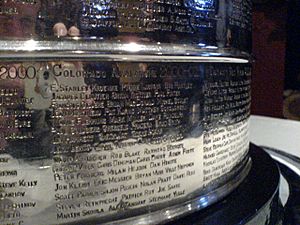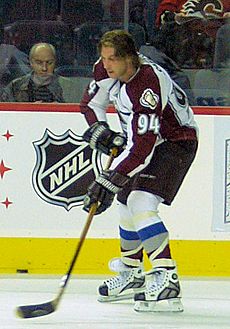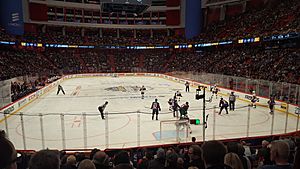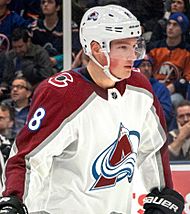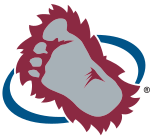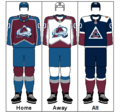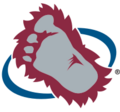Colorado Avalanche facts for kids
Quick facts for kids Colorado Avalanche |
|
|---|---|
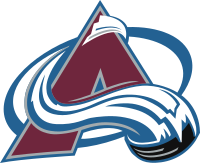 |
|
| Conference | Western |
| Division | Central |
| Founded | 1972 |
| History | Quebec Nordiques 1972–1979 (WHA) 1979–1995 (NHL) Colorado Avalanche 1995–present |
| Home arena | Ball Arena |
| City | Denver, Colorado |
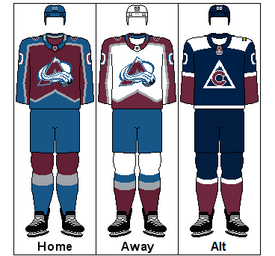 |
|
| Colors | Burgundy, blue, silver, black |
| Media | Altitude Sports and Entertainment Altitude 950 Altitude Sports 92.5 |
| Owner(s) | Kroenke Sports & Entertainment |
| General manager | Chris MacFarland |
| Head coach | Jared Bednar |
| Captain | Gabriel Landeskog |
| Minor league affiliates | Colorado Eagles (AHL) Utah Grizzlies (ECHL) |
| Stanley Cups | 3 (1995–96, 2000–01, 2021–22) |
| Conference championships | 3 (1995–96, 2000–01, 2021–22) |
| Presidents' Trophies | 3 (1996–97, 2000–01, 2020–21) |
| Division championships | 12 (1995–96, 1996–97, 1997–98, 1998–99, 1999–00, 2000–01, 2001–02, 2002–03, 2013–14, 2020–21, 2021–22, 2022–23) |
The Colorado Avalanche, often called the Avs, are a professional ice hockey team based in Denver. They play in the National Hockey League (NHL) as part of the Central Division in the Western Conference. The team plays its home games at Ball Arena. They share this arena with the National Basketball Association's (NBA) Denver Nuggets and the Colorado Mammoth of the National Lacrosse League (NLL).
The team started in 1972 as the Quebec Nordiques. They were one of the first teams in the World Hockey Association (WHA). In 1979, the team joined the NHL. After the 1994–95 season, the team was sold and moved to Denver.
In their first season in Denver, the Avalanche won the Pacific Division. They then won the 1996 Stanley Cup Final by defeating the Florida Panthers. This made the 1996 Avalanche the first Denver team in a major North American sports league to win a championship. They were also the second major North American sports team to win a championship one year after moving. In the 2001 Stanley Cup Final, the Avalanche won their second championship against the New Jersey Devils. In the 2022 Stanley Cup Final, they won their third championship by beating the Tampa Bay Lightning. The Avalanche are the only active NHL team to have won every Stanley Cup Final they have played in.
Since moving to Denver, the Avalanche have won twelve division titles. They also set an NHL record by winning nine consecutive division titles from 1995 to 2003. They made the playoffs in their first ten seasons after moving. This streak ended in 2007.
Contents
- Team History: From Quebec to Colorado
- The Quebec Nordiques Years (1972–1995)
- The Colorado Avalanche Era (1995–Present)
- Team Information
- Season-by-Season Performance
- Players and Team Leaders
- Honored Members
- Team Rivalries
- Team Records and Leaders
- Images for kids
- See also
Team History: From Quebec to Colorado
The Quebec Nordiques Years (1972–1995)
The Quebec Nordiques were one of the first teams in the World Hockey Association (WHA) in 1972. The team was first planned for San Francisco but moved to Quebec City before the season began. During their seven years in the WHA, the Nordiques won the Avco World Trophy once in 1977. They also reached the finals in 1975. In 1979, the team joined the NHL. Other WHA teams like the Edmonton Oilers also joined the NHL at that time.
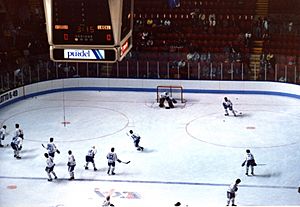
After making the playoffs for seven years in a row (1981 to 1987), the Nordiques started to struggle. From 1987–88 to 1991–92, they finished last in their division every season. Three of those times, they were last in the entire league. This included a very tough season in 1989–90 with only 12 wins. This is still the worst season in the team's history. Because of these struggles, the team got three top draft picks in a row. They used these picks to choose Mats Sundin (1989), Owen Nolan (1990), and Eric Lindros (1991).
Lindros did not want to play for the Nordiques. He even refused to wear the team's jersey for photos. He did not sign a contract for over a year. On June 30, 1992, he was traded to the Philadelphia Flyers. In return, the Nordiques received five players, the rights to a young player named Peter Forsberg, two first-round draft picks, and US$15 million. This trade, known as the Eric Lindros trade, quickly turned the Nordiques into a strong team. Many people now see it as one of the most one-sided trades in sports history. In the first season after the trade (1992–93), the Nordiques made the playoffs for the first time in six years. Two years later, they won their division and had the second-best record in the league.
Even with success on the ice, the team faced financial problems. Quebec City was the smallest market in the NHL. In 1995, the team owner asked the government for help and a new arena. When this help did not happen, the team was sold to a group in Denver. This group already owned the Denver Nuggets basketball team. The sale became official on July 1, 1995. After the move was announced, 12,000 season tickets were sold very quickly.
The new owners thought about different names for the team, like "Extreme" or "Blizzards." They also thought about whether to call the team a Denver team or a team for all of Colorado. They first considered "Rocky Mountain Extreme." But fans did not like this name when it was leaked. So, they chose the name Colorado Avalanche. The new name was announced on August 10, 1995. With the move, the team joined the Pacific Division of the Western Conference.
The Colorado Avalanche Era (1995–Present)
Early Success and First Stanley Cup (1995–2001)
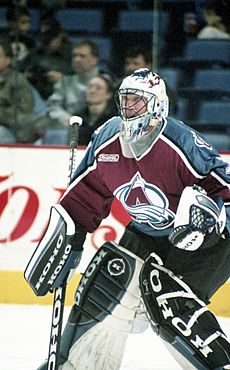
After buying the team, the new owners created a separate company for their Denver sports teams. The Avalanche played their first game in Denver on October 6, 1995, at the McNichols Sports Arena. They won 3–2 against the Detroit Red Wings. This brought NHL hockey back to Denver after 13 years. The previous Denver NHL team, the Colorado Rockies, had moved to New Jersey. Valeri Kamensky scored the first goal for the Avalanche and the winning goal in that first game.
The team was led by captain Joe Sakic, forward Peter Forsberg, and defenseman Adam Foote. The team became even stronger when All-Star goalie Patrick Roy joined them. Roy came to the Avalanche on December 6, 1995, in a trade with the Montreal Canadiens.
Winning the Stanley Cup in 1996
The Avalanche finished the regular season with a strong record of 47 wins, 25 losses, and 10 ties. They won their division and finished second in the Western Conference. In the playoffs, Colorado beat the Vancouver Canucks, Chicago Blackhawks, and the Detroit Red Wings. All these series were won in six games. In the 1996 Stanley Cup Final, the Avalanche played against the Florida Panthers. The Panthers were also in their first Finals. The Avalanche won the series 4–0, sweeping their opponents. In Game 4, after more than 100 minutes of play with no goals, defenseman Uwe Krupp scored in the third overtime. This goal won the team's first Stanley Cup. Joe Sakic was the top scorer in the playoffs with 34 points. He won the Conn Smythe Trophy as the most valuable player in the playoffs. The 1995–96 Cup was the first major championship won by a Denver team.
The Avalanche are the only team in NHL history to win the Stanley Cup in their first season after moving. They also became the second team from the WHA to win the Cup. With this win, Russian players Alexei Gusarov and Valeri Kamensky, and Swedish player Peter Forsberg, joined the Triple Gold Club. This special group includes players who have won Olympic gold, World Championship gold, and the Stanley Cup.
In the 1996–97 season, Colorado won their division again. They also won the Presidents' Trophy for having the best record in the NHL. The team was also the best at scoring goals. In the playoffs, the Avalanche lost to the Detroit Red Wings in six games.
In 1997, Joe Sakic signed a large contract offer from the New York Rangers. The Avalanche had one week to match the offer or lose Sakic. Colorado matched the offer, which helped lead to higher salaries for NHL players.
Nine Avalanche players and coach Marc Crawford played in the 1998 Winter Olympics in Japan. Alexei Gusarov and Valeri Kamensky won silver medals with Russia. Jari Kurri won bronze with Finland.
In the next season, Colorado won their division again. However, they lost in the first round of the playoffs to the Edmonton Oilers in seven games. Peter Forsberg was the NHL's second-highest scorer that season. After the season, coach Marc Crawford left, and Bob Hartley was hired in June 1998.
In 1998–99, the NHL changed its divisions. The Avalanche moved to the new Northwest Division. After a slow start, Colorado finished strong and won their division. They also finished second in the Western Conference. The Avalanche had their longest winning streak ever with 12 games. After the Columbine High School massacre, Colorado postponed their first two playoff games. They wore patches on their jerseys to honor the victims. After beating the San Jose Sharks and Detroit Red Wings, Colorado lost to the Dallas Stars in the conference finals. Forsberg was the top scorer in the playoffs. Chris Drury won the Calder Memorial Trophy as the best rookie.
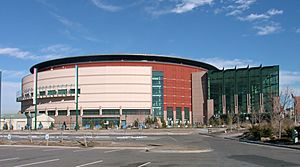
In the 1999–2000 season, the Colorado Avalanche played their first game in the new Pepsi Center. This arena cost US$160 million. Milan Hejduk scored the first goal in a 2–1 win against the Boston Bruins. The Avalanche won their division that season. Before the playoffs, the Avalanche added Hall of Fame defenseman Ray Bourque and forward Dave Andreychuk. Bourque had played for the Bruins since 1979 and wanted to join a team that could win the Stanley Cup. However, Colorado lost to the Dallas Stars in the conference finals.
The team's success happened during some changes in ownership. After some back-and-forth, the teams and the Pepsi Center were bought by Stan Kroenke in July 2000. As part of the deal, Kroenke promised the teams would stay in Denver until at least 2025.
Winning the Stanley Cup in 2001
The 2000–01 season was the team's best ever. This was thanks to amazing play by Joe Sakic, who became the Avalanche's all-time leading scorer. The Avalanche won their division and their second Presidents' Trophy. Sakic finished the season with 118 points. On February 4, 2001, the Avalanche hosted the 51st National Hockey League All-Star Game. Patrick Roy, Ray Bourque, and Joe Sakic played for the North American team. Milan Hejduk and Peter Forsberg played for the World team. Before the playoffs, the Avalanche got star defenseman Rob Blake and center Steven Reinprecht in a trade.
In the playoffs, Colorado swept the Vancouver Canucks. In the next round, they beat the Los Angeles Kings in seven games. After that series, Peter Forsberg had surgery and could not play until the next season. This was a big loss for the team. But the team overcame it. In the conference finals, Colorado beat the St. Louis Blues and reached the Stanley Cup Finals. They faced the defending champion New Jersey Devils. The Avalanche came back from being down 3–2 in the series and won 4–3. After receiving the Cup, captain Joe Sakic immediately gave it to Ray Bourque. This was Bourque's first and only championship in his 22-year career. Sakic was the top scorer in the playoffs. He won the Hart Memorial Trophy (MVP), the Lady Byng Memorial Trophy (sportsmanship), and the Ted Lindsay Award. Patrick Roy won the Conn Smythe Trophy as the playoff MVP.
Staying Competitive (2001–2010)
In the 2001–02 season, Colorado won the Northwest Division again. They had the fewest goals scored against them in the league. The NHL season was paused for the 2002 Winter Olympics in Salt Lake City. Nine Avalanche players represented their countries. Canada won the gold medal, with Rob Blake, Adam Foote, and Joe Sakic. American Chris Drury won a silver medal. With this win, Blake and Sakic joined the Triple Gold Club. The Avalanche won their first two playoff rounds. They reached the conference finals for the fourth year in a row. They played the Detroit Red Wings for the fifth time in seven years. Colorado led the series 3–2 but lost the last two games. Detroit then won the 2002 Stanley Cup Final. Peter Forsberg was the top scorer in the playoffs. Roy won the William M. Jennings Trophy for the team with the fewest goals against.
The next season (2002–03) saw the Avalanche set an NHL record. They won their ninth consecutive division title. This broke the Montreal Canadiens' record of eight titles. The team had a tough start, and coach Bob Hartley left in December. Assistant coach Tony Granato took over. The team finished strong and won the division on the last day of the season. In the playoffs, the Avalanche lost to the Minnesota Wild in seven games. Peter Forsberg won the Art Ross Trophy as the league's top scorer. He also won the Hart Memorial Trophy. Milan Hejduk scored 50 goals to win the Maurice "Rocket" Richard Trophy.
Patrick Roy retired after that season. The team signed star players Paul Kariya and Teemu Selänne. Both struggled in their first season with the team. Kariya was often injured. There were also questions about whether goalie David Aebischer could play as well as Roy. The team failed to win the Northwest Division title, ending their record streak of nine consecutive titles.
During a game on March 8, 2004, against Vancouver, Colorado's Steve Moore was seriously injured. This incident ended his career.
In the 2004 playoffs, Colorado beat the Dallas Stars but lost to the Sharks. Joe Sakic was chosen for the 2004 National Hockey League All-Star Game and won the MVP award. In July 2004, Joel Quenneville was hired as head coach.
The 2004–05 NHL season was canceled due to a lockout. Many Avalanche players played in European leagues during this time.
After the lockout, the NHL introduced a salary cap. This forced the Avalanche to let go of some top players like Peter Forsberg and Adam Foote. Even so, the team finished the 2005–06 season strong. They finished second in their division. The season paused for the 2006 Winter Olympics in Italy. The Avalanche sent 11 players, more than any other team. Finland's Antti Laaksonen won a silver medal. Milan Hejduk won a bronze medal with the Czech Republic. In the playoffs, Colorado beat the Dallas Stars but were then swept by the Anaheim Ducks.
After that season, general manager Pierre Lacroix resigned. François Giguère took his place. Lacroix remained president of the team until 2013.
By the 2006–07 season, Joe Sakic and Milan Hejduk were the only players left from the 2001 Stanley Cup team. Sakic was the only one from the Quebec Nordiques days. Paul Stastny, son of Nordiques legend Peter Stastny, also joined the team. The Avalanche traded goalie Aebischer for Vezina Trophy winner Jose Theodore. However, Theodore did not play as well as hoped. The team's 11-year sell-out streak of 487 home games ended on October 16, 2006. This was an NHL record for consecutive home sell-outs.
The Avalanche missed the playoffs in 2006–07 for the first time since 1993–94. They had a strong finish to the season but lost their last playoff spot on the second-to-last day. Joe Sakic scored 100 points that season, becoming the second-oldest player in NHL history to do so. Paul Stastny set an NHL record for the longest point streak by a rookie with 20 games.
For the 2007–08 season, the Avalanche signed defensemen Scott Hannan and left winger Ryan Smyth. Peter Forsberg also returned to play for the rest of the season. At the trade deadline, they got defenseman Adam Foote back. In the playoffs, Colorado beat the Minnesota Wild but were then swept by the Detroit Red Wings. Detroit went on to win the Stanley Cup.
On May 9, 2008, Joel Quenneville left as coach. Two weeks later, Tony Granato was named head coach for the second time.
The 2008–09 season was the worst for the Avalanche since moving to Denver. They finished 15th in the Western Conference and missed the playoffs. It was the first time in Avalanche history that their top scorer had less than 70 points. On April 13, 2009, general manager Francois Giguere was let go. Colorado received the third overall draft pick, their highest ever. They used it to draft Matt Duchene.
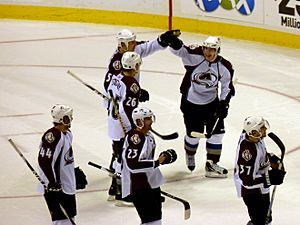
In the 2009 off-season, Greg Sherman became the new general manager, and Joe Sacco became the new head coach. Ryan Smyth was traded, and Joe Sakic retired after 21 seasons. Sakic was the only captain the Avalanche had ever known. Adam Foote was named the new captain. Sakic's jersey was retired on October 1, 2009. The Avalanche started the season strong. Three Avalanche players played in the 2010 Winter Olympics. After the Olympics, the Avalanche struggled but still made the playoffs. They lost to the top-seeded San Jose Sharks in six games.
Stan Kroenke bought full ownership of the NFL's St. Louis Rams in 2010. Since NFL rules do not allow owners to control teams in other NFL cities, Kroenke gave control of the Nuggets and Avalanche to his son, Josh.
A Period of Decline (2010–2017)
In the 2010–11 season, the Avalanche had their worst season since moving to Denver. They finished 29th in the 30-team NHL. Matt Duchene became the youngest scoring leader in franchise history. Former Avalanche player Peter Forsberg tried to make a comeback but retired after two games. Captain Adam Foote also retired after the season.
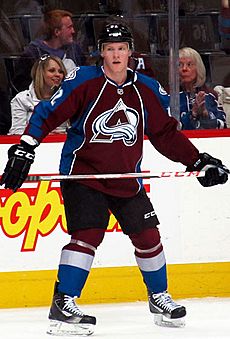
In the off-season, Colorado had two first-round draft picks. Former Avalanche star Joe Sakic became an adviser for the team. With their first pick, second overall, they chose Gabriel Landeskog. They also picked defenseman Duncan Siemens. Goalie Semyon Varlamov was traded to Colorado. Veteran goalie Jean-Sébastien Giguère was signed to help mentor Varlamov. Gabriel Landeskog made the team's opening night roster. Peter Forsberg's number 21 jersey was retired. The Avalanche lost their first game but won their second against the defending champion Boston Bruins. In April 2012, the Avalanche missed the playoffs for the second year in a row. This was the first time this happened since they moved to Denver. Coach Joe Sacco signed a two-year contract extension. Gabriel Landeskog became the youngest player in franchise history to lead the team in goals.
In the 2012 off-season, the team added Greg Zanon, John Mitchell, and P. A. Parenteau. Gabriel Landeskog won the Calder Memorial Trophy as the best rookie.
On September 4, 2012, Gabriel Landeskog was named the fourth captain of the Avalanche. At 19 years old, he became the youngest captain in NHL history at that time.
After a disappointing 2012–13 season, coach Joe Sacco was let go. On May 10, 2013, Joe Sakic was named Executive Vice President of hockey operations. Josh Kroenke became President of the Avalanche. On May 23, Patrick Roy returned to the Avalanche as head coach and Vice President of hockey operations. Roy and Sakic shared many of the general manager duties. The Avalanche had the top pick in the 2013 NHL draft. They used it to draft Nathan MacKinnon.
Under Roy, in 2013–14, the Avalanche returned to the playoffs. They finished first in their division. However, they lost to the Minnesota Wild in the first round. Roy won the Jack Adams Award as the NHL's top coach.
Before the 2014–15 season, Sakic was officially named general manager. The Avalanche failed to make the playoffs in 2015. They also missed the playoffs after the 2015–16 season. Roy resigned on August 11, 2016.
The Avalanche hired Jared Bednar as head coach. Bednar was hired just a month before training camp, which was a difficult situation. On December 10, 2016, the Avalanche lost 10–1 to the Canadiens. The Avalanche finished the season with a very poor record. It was their worst record since moving to Denver. In the 2017 NHL draft, Colorado picked defenseman Cale Makar fourth overall.
Return to Success and Third Presidents' Trophy (2017–2021)
On November 5, 2017, the Avalanche traded Matt Duchene to the Ottawa Senators in a three-team trade. The Avalanche received several players and draft picks, including Samuel Girard. The Avalanche had a ten-game winning streak in January. Nathan MacKinnon and Mikko Rantanen led the offense. MacKinnon finished fifth in league scoring. The Avalanche made the playoffs in their final game of the season. They finished with 95 points, a big improvement from the previous season. They played against the Presidents' Trophy-winning Nashville Predators in the first round. The Avalanche lost the series in six games.
On November 18, 2018, the Avalanche earned their 1,000th win in team history. On May 2, 2019, the City of Denver and the team owners agreed to keep the Avalanche and Nuggets in the city until 2040. The Avalanche returned to the playoffs in 2019. They beat the Calgary Flames in five games. Rookie Cale Makar scored in his first career game. The Avalanche were then eliminated in game 7 of the second round by the San Jose Sharks.
In the 2019 off-season, the Avalanche traded defenseman Tyson Barrie for Nazem Kadri. The Avalanche improved their record and were second in their division when the COVID-19 pandemic paused the 2019–20 season. When the NHL season restarted, the Avalanche beat the Arizona Coyotes in the first round. They were then eliminated in game 7 by the Dallas Stars in the second round.
After the 2020 playoffs, the Avalanche got Devon Toews in a trade. The Avalanche continued to improve and won the Presidents' Trophy in the 2020–21 season. They started the playoffs with six straight wins, including a sweep over the St. Louis Blues. However, they lost to the Vegas Golden Knights in six games after leading the series 2–0. This was their third straight second-round exit.
Third Stanley Cup Championship (2021–2022)
In the 2021 off-season, goalie Philipp Grubauer left the team. The Avalanche traded for Darcy Kuemper to be their new goalie. In the 2021–22 season, the Avalanche finished with 119 points. They made the playoffs for the fifth year in a row. They started the playoffs by sweeping the Nashville Predators. Then they beat the St. Louis Blues in six games. This sent them to the conference finals for the first time in 20 years. The Avalanche then swept the Edmonton Oilers to reach the Stanley Cup Final. On June 26, 2022, the Avalanche won their third Stanley Cup. They beat the two-time defending champion Tampa Bay Lightning in six games. After their victory, the Avalanche had a playoff record of 16 wins and 4 losses. This tied for the best playoff record since 1988. Cale Makar won the Conn Smythe Trophy as playoff MVP and the James Norris Memorial Trophy as the best defenseman.
Recent Seasons (2022–Present)
In the 2022–23 season, the Avalanche won their division. However, they were upset by the Seattle Kraken in seven games in the first round of the 2023 playoffs. In the 2023–24 season, the Avalanche finished third in the Central Division. They beat the Winnipeg Jets in five games in the first round of the 2024 playoffs. They then lost to the Dallas Stars in six games in the second round. The 2024-25 season saw the Avalanche finish third in the Central Division again. They lost in the first round of the playoffs to the Dallas Stars in seven games.
Team Information
Team Logo
The Colorado Avalanche logo is a burgundy letter A. It has snow wrapped around it, like an avalanche. There is a hockey puck at the bottom right of the snow. A steel blue oval is in the background.
The team's first alternate logo was the foot of a Yeti. This logo was on the shoulders of their jerseys from 1995 to 2015. In 2015, the team showed a new alternate logo. This new logo uses the design from the Colorado state flag. Its colors match the team's colors. This logo was on a patch on the shoulders of their uniforms for the 2015–16 season.
Team Jerseys
The team colors are burgundy, steel blue, black, silver, and white. In 2007–08, the NHL introduced new "Reebok EDGE" jerseys. The Avalanche's new jerseys were similar to their old ones but with some added lines.
From 1995 to 2003, the home jersey was mostly burgundy and steel blue. It had black and white zigzag lines on the shoulders and near the belly. The away jersey was similar but used white where the home jersey used burgundy. In 2003, the NHL switched so that teams wore colored jerseys at home and white jerseys on the road.
The Avalanche introduced a third jersey in the 2001–02 season. It was mostly burgundy. The word "Colorado" was written diagonally across the front. It had three large horizontal stripes at the bottom. This third jersey was not used in the 2007–08 or 2008–09 seasons.
In the 2009–10 season, the Avalanche introduced a new third jersey. It was similar to the old one but was mainly steel blue instead of burgundy. It also had burgundy patches on the shoulders with the "A" logo.
Before the 2015–16 season, the Avalanche changed their uniforms. They replaced the yeti foot shoulder logo with the burgundy and black "C" logo. A new third jersey was also shown. It was mainly navy blue and had a smaller, recolored version of the Rockies logo on the front.
The "C" logo was also on the front of the Avalanche's 2016 Stadium Series uniforms. These were white with large letters and numbers.
Before the 2017–18 season, the Avalanche showed new uniforms as part of the switch to Adidas. The design was inspired by their original uniforms from 1995 to 2007. They added a silver border to honor Colorado's silver mining industry. For the 2018–19 season, the Avalanche used their 2015–2017 navy uniforms as alternates. These navy uniforms are now used for home games against Central Division opponents.
For the 2020 Stadium Series, the Avalanche wore special uniforms. These were inspired by Colorado's landscape and the Cadet Chapel. The uniforms had a steel blue top and burgundy bottom. White accents formed an "A" shape on the front.
Before the 2020–21 season, the Avalanche showed a "Reverse Retro" alternate uniform. This design used the classic Quebec Nordiques uniforms but with the Avalanche's current colors. The Avalanche also changed their pants and helmets to steel blue instead of black. The next season, the road white uniforms were changed to have burgundy player names and steel blue numbers.
A second "Reverse Retro" uniform was shown in the 2022–23 season. It used the 1995–2007 white uniform design. But it was recolored to the blue, red, and gold colors of the Colorado state flag. The "C" alternate logo was used on the front.
Team Broadcasters
Avalanche games are shown on Altitude Sports and Entertainment since 2004. Peter McNab, who was the team's color commentator from 1995 until his death in 2022, is honored at Ball Arena.
- Marc Moser – TV play-by-play
- Mark Rycroft – TV color commentator
- John-Michael Liles – TV studio analyst
- Kyle Keefe – TV studio host
- Conor McGahey – Radio play-by-play/analyst
- Mark Bertagnolli – Radio studio host
- Alan Roach – Public address
Season-by-Season Performance
This is a partial list of the last five seasons completed by the Avalanche. For the full history, see List of Colorado Avalanche seasons
Note: GP = Games played, W = Wins, L = Losses, OTL = Overtime Losses, Pts = Points, GF = Goals for, GA = Goals against
| Season | GP | W | L | OTL | Pts | GF | GA | Finish | Playoffs |
| 2020–21 | 56 | 39 | 13 | 4 | 82 | 197 | 133 | 1st, West | Lost in second round, 2–4 (Golden Knights) |
| 2021–22 | 82 | 56 | 19 | 7 | 119 | 312 | 234 | 1st, Central | Stanley Cup champions, 4–2 (Lightning) |
| 2022–23 | 82 | 51 | 24 | 7 | 109 | 289 | 226 | 1st, Central | Lost in first round, 3–4 (Kraken) |
| 2023–24 | 82 | 50 | 25 | 7 | 107 | 304 | 254 | 3rd, Central | Lost in second round, 2–4 (Stars) |
| 2024–25 | 82 | 49 | 29 | 4 | 102 | 277 | 234 | 3rd, Central | Lost in first round, 3–4 (Stars) |
Players and Team Leaders
Team Captains
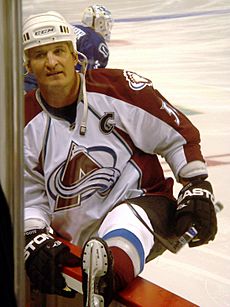
Note: This list does not include captains from the Quebec Nordiques.
- Joe Sakic, 1995–2009
- Adam Foote, 2009–2011
- Milan Hejduk, 2011–2012
- Gabriel Landeskog, 2012–present
General Managers
Note: This list does not include general managers from the Quebec Nordiques.
- Pierre Lacroix, 1995–2006
- Francois Giguere, 2006–2009
- Greg Sherman, 2009–2014
- Joe Sakic, 2014–2022
- Chris MacFarland, 2022–present
Head Coaches
The current head coach is Jared Bednar, who was named on August 31, 2016.
Honored Members
Retired Jersey Numbers
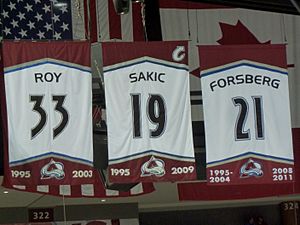
The NHL also retired Wayne Gretzky's No. 99 for all teams in 2000.
| No. | Player | Position | Career | No. retirement |
|---|---|---|---|---|
| 19 | Joe Sakic 1 | C | 1995–2009 | October 1, 2009 |
| 21 | Peter Forsberg | C | 1995–2004 2008, 2011 |
October 8, 2011 |
| 23 | Milan Hejduk | RW | 1998–2013 | January 6, 2018 |
| 33 | Patrick Roy | G | 1995–2003 | October 28, 2003 |
| 52 | Adam Foote | D | 1995–2004 2008–2011 |
November 2, 2013 |
| 77 | Ray Bourque | D | 2000–2001 | November 24, 2001 |
Notes:
- 1 The banner shows the captain "C" to honor his eighteen years as team captain. This includes his time with both the Avalanche and the Nordiques.
The numbers retired when the team was in Quebec were put back into use after the move to Colorado.
Hockey Hall of Famers
Several players and one builder connected to the Colorado Avalanche are in the Hockey Hall of Fame. Players
- Dave Andreychuk
- Rob Blake
- Ray Bourque
- Peter Forsberg
- Jarome Iginla
- Paul Kariya
- Jari Kurri
- Patrick Roy
- Joe Sakic
- Teemu Selanne
- Pierre Turgeon
Builders
- Pierre Lacroix
Team Rivalries
Rivalry with the Detroit Red Wings
In 1996, the Colorado Avalanche played the Detroit Red Wings in the conference finals. The Avalanche won the series 4–2. During Game 6, an incident occurred where Red Wings player Kris Draper was injured. This event started a rivalry that many consider one of the most intense in NHL history.
In the next season, on March 26, 1997, a big fight happened between the Avalanche and the Red Wings. This game ended with many fights and penalties. The Red Wings won the game in overtime. The teams met again in the conference finals that season. The Red Wings won that series and then went on to win the Stanley Cup.
The rivalry between the Avalanche and the Red Wings was strongest from 1996 to 2002. During these seven seasons, the two teams played five playoff series against each other. The Avalanche won three of them, and the Red Wings won two. In this time, these two teams won a total of five Stanley Cups. The Avalanche won twice, and the Red Wings won three times. After 2002, the rivalry became less intense. The teams did not meet in the playoffs again until 2008. The Red Wings swept the Avalanche in that series and won the Stanley Cup. The Red Wings moved to the Eastern Conference in 2013–14. Now, the two teams only play each other twice a year.
Team Records and Leaders
Top Scorers in Franchise History
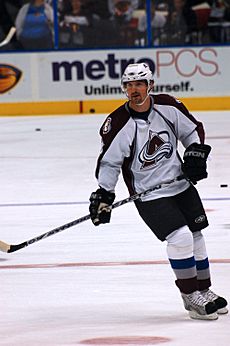
These are the top ten players with the most points in the team's history (including Quebec and Colorado). Figures are updated after each NHL regular season.
- * – current Avalanche player
Note: Pos = Position; GP = Games played; G = Goals; A = Assists; Pts = Points; P/G = Points per game
|
|
|
Franchise Records
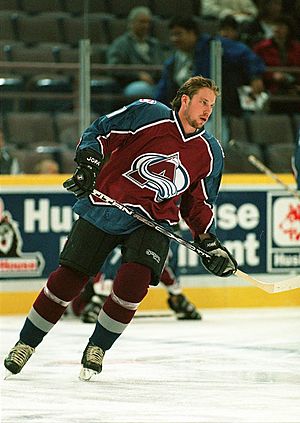
Note: This list does not include records from the Quebec Nordiques. Items in bold are NHL records.
Records as of the 2024–25 season
Regular Season Records
- Most goals in a season: Mikko Rantanen, 55 (2022–23)
- Most assists in a season: Nathan MacKinnon, 89 (2023–24)
- Most points in a season: Nathan MacKinnon, 140 (2023–24)
- Average points per game in a season: Nathan MacKinnon, 1.70 (2023–24)
- Most points in a season by a defenseman: Cale Makar, 92 (2024–25)
- Most goals in a season by a defenseman: Cale Makar, 30 (2024–25)
- Average points per game in a season by a defenseman: Cale Makar, 1.16 (2023–24)
- Most penalty minutes in a season: Jeff Odgers, 259 (1998–99)
- Most game-winning goals in a season: Joe Sakic, 12 (2000–01)
- Most points in a season by a rookie: Paul Stastny, 78 (2006–07)
- NHL record longest points streak by a rookie: Paul Stastny, 20 games (2006–07)
- Best +/- record in a season: Milan Hejduk and Peter Forsberg (2002–03), Devon Toews, +52 (2021–22)
- Most wins in a season by a goalie: Semyon Varlamov, 41 (2013–14)
- Most shutouts in a season by a goalie: Patrick Roy, 9 (2001–02)
- Best goals-against average in a season by a goalie: Patrick Roy, 1.94 (2001–02)
Playoff Records
- Most goals in a playoff season: Joe Sakic, 18 (1996)
- Most assists in a playoff season: Cale Makar, 21 (2022)
- Most points in a playoff season: Joe Sakic, 34 (1996)
- Most goals in a playoff season by a defenseman: Cale Makar, 8 (2022)
- Most assists in a playoff season by a defenseman: Cale Makar, 21 (2022)
- Most points in a playoff season by a defenseman: Cale Makar, 29 (2022)
- Most penalty minutes in a playoff season: Adam Foote, 62 (1997)
- Most overtime game-winning goals in playoff career: Joe Sakic, 8
- Best +/- record in playoff career: Peter Forsberg, 54
Team Records
- Most consecutive division titles: 9 (1994–95 to 2002–03)
- Most points in a season: 119 (2021–22)
- Most wins in a season: 56 (2021–22)
- Most goals in a season: 326 (1995–96)
- Largest margin of victory: 10 (12–2, December 5, 1995, vs San Jose)
- Longest consecutive attendance sellout: 487 (1995–2006)
- Most points without making Stanley Cup playoffs: 95 (2006–07)
Images for kids
See also
 In Spanish: Colorado Avalanche para niños
In Spanish: Colorado Avalanche para niños
 | Charles R. Drew |
 | Benjamin Banneker |
 | Jane C. Wright |
 | Roger Arliner Young |


